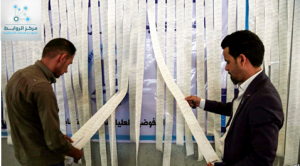The results of the Iraqi elections, which took place on 12 May last, received wide attention internally, Arab, regionally and internationally, pursued by the media networks with all their tools and means and became basic subject matter in the major news bulletins for several days as they constitute a major turning point in the nature of political situations and events taking place in the Arab region and the Middle East taking Strategic dimensions in determining the dimensions of the international and regional project in Iraq.
That the priorities and results of the elections and the field features that it was characterized by important internal turns reflected on the nature of relations between the blocks and political parties, especially after the results of the elections ended and surprised many of the political circles that follow the Iraqi political scene by winning ( Saroon ) bloc getting the first rank and the retreat of ( al-Nasir) coalition , which is headed by Prime Minister Haider Abadi , to the third place, which was expected to be in the forefront of the results in addition to the existence of the list (al-Fatah) as an important element in the Iraqi political equation took its role in the results of the Iraqi elections.
After the results, many of the observations and opinions and criticism were emerged in the following features:
1.The process of the Iraqi elections for this session was characterized by a lot of criticism and disagreements between all the blocs, parties and political figures involved in the political process and the Iraqi elections, a phenomenon did not happen in the previous sessions and this confirms the nature of the methods used in the process of preparing for the elections and fundamental differences in the political vision of the parties for the next four years and its objectives in reaching the helm of the premiership.
2. The results of the elections led to a state of confusion in the political circles of the party leaders, which dominated for a decade and a half after the US occupation of Iraq on the Iraqi political decision and control of it that the results of the election included many of these faces and directed a huge popular blow to them represented by non-renewal for them in the coming Years and these faces failed to get enough votes to stay within the House of Representatives, whose leaders and its important party centers were dominating on the political scene .
3. The wide differences between the Electoral Commission and the Council of Representatives as the legislative authority, which was convened in open extraordinary sessions to discuss the results of the elections and objections, complaints and appeals that affected the Commission and its work and its performance in many stations and electoral centers inside and outside Iraq, where it led to the issuance of many recommendations and decisions that work to the counting of votes again and the use of manual sorting and counting in several electoral centers, specifically in the provinces of Kirkuk, Anbar, the Kurdistan region and some of the Arab and European countries.
4. The Electoral Commission delayed the ratification of the election results despite the announcement and we see in this action a political position followed by the Commission to give time for the discussions between political parties and blocs to choose the largest bloc to form the next ministry in Iraq with the declaration of who will be its president.
5. The House of Representatives has taken practical measures to keep pace with the results of the elections and its insistence on holding its extraordinary sessions, although most of them have not yet completed the quorum for issuing resolutions. However, the Council of Deputies remains a legislative and supervisory body and has no right to enforce its decisions except through the executive and judicial branches but it could to withholding trust and replacing the Electoral Commission.
6. The Iraqi scene is still witnessing many political fragmentation in all its aspects and pillars, especially in the coalitions and alliances that took place during the past few days and they were represented by the emergence of two political coalitions of the Sunni Arabs which is a clear reflection of the lack of real vision in how to address the political errors that were one of the features of the electoral process and its results and the lack of clarity and accuracy of the main objectives pursued by the political parties and blocs of Iraq.
Iraqi Studies Unit
Rawabet Center for Research and Strategic Studies

